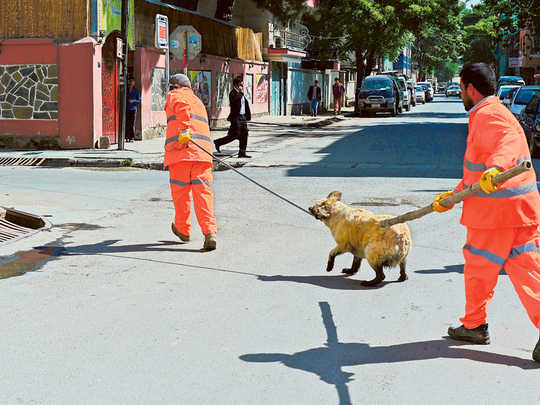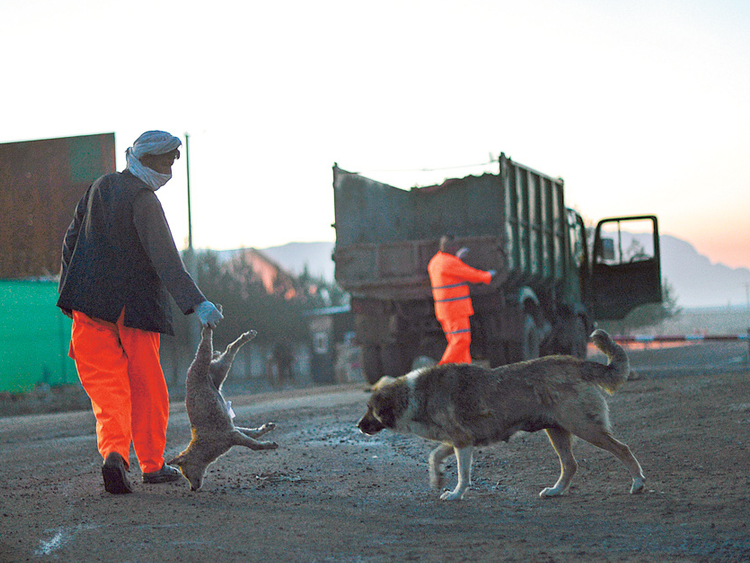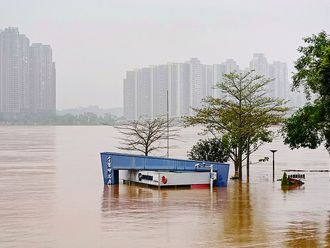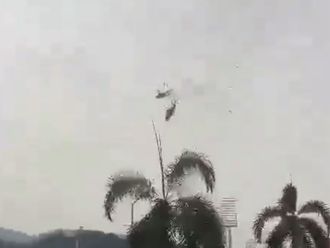
Kabul: Cornered against a wall and with a steel hook pushed around his neck, the dog emits a savage howl in a desperate attempt to fight free, but poison will soon be forced into his mouth as Kabul’s cull of strays claims another kill.
About 17,600 dogs were poisoned last year by municipal workers in the Afghan capital in an effort to protect residents from disease and to control the rocketing population of canines that roam the city’s streets and open ground.
The method of killing is brutally effective.
Teams of dog-catchers wearing orange suits use long steel hooks, wooden bars and large nets to ensnare their prey with practised skill.
A heavy boot is put on the dog’s neck, and a spoon is used to press deadly strychnine into the mouth and gums.
Then the dogs are tied to ropes, and die within an hour in spasms of agony.
Alternatively, poisoned meat is left out at night and by morning the ground is littered with corpses.
The dogs, sometimes showing the final flickers of life, are thrown into the back of a truck and dumped on waste tips on the city outskirts.
“Every day, after evening prayers, we do this mass poisoning programme, working until 10pm, and we come back at 3am,” said dog-catcher Islamuddin.
“We find these dogs, poison them and dump them where they will be buried.”
Like many residents in the Pul-e-Charkhi neighbourhood where he works, Islamuddin has no qualms about killing dogs as part of a city policy that is widely seen as a necessary health precaution.
It is uncertain how many strays have rabies in Kabul, but the disease is much feared as it is often fatal to humans if they are bitten or scratched by an infected dog.
Riaz Gul, from the nomadic Kuchi tribe that has a small camp in Pul-e-Charkhi, believes his 12-year-old son’s recent death was caused by a dog bite.
“He was bitten on his arm, and then after about 50 days he started to seem crazy and get ill,” he said.
“I took him to a doctor and mullah, but to no avail, and he died.
“Of course, I am scared of the dogs. About 200 of them live in packs in this area.”
Wherever the dog-catching team works, locals gather to watch the animals be trapped, poisoned and then die a slow death.
Dogs are regarded as unclean in Islam, and in Afghanistan they are generally only kept as guard dogs or for organised dog fights rather than as domestic pets.
“They attack people going to the mosque and children walking to school. They spread disease,” said Nasser Ahmad Ghori, director of the Kabul city sanitation department.
“It is difficult to control them as they are in such great numbers, more than 100,000, I guess, and increasing.
“Citizens have been complaining more, and in the past few months we have been running out of poison. We have to do something.”
Ghori said plans to neuter dogs to stop breeding or to launch a rabies vaccination programme were being considered in consultation with veterinary and health officials, but no other practical solution was currently available.
“We have 30 people on duty culling dogs full-time because they cause us so much trouble,” he said.
Animal welfare experts dismiss the cull as wantonly cruel — and futile.
“We agree there is a major problem of too many dogs,” said Louise Hastie, a British expat who runs the Nowzad animal rescue shelter in Kabul.
“But the cull only means that new packs of dogs replace the dead ones within weeks, and they are more likely to have rabies as they come down from the mountains.
“The only answer is to trap, neuter, vaccinate and release the dogs — and we are working with the authorities to set that up.
“People may not think animal welfare is important in a country like Afghanistan, and the government does have other priorities.
“But the truth is many Afghans are appalled by the daily massacre. We just have to change the minds of the officials.”
One Kabul resident, Ghazal Sharifi, a dentist, told AFP how she had befriended a stray dog that had six puppies near her workplace — and one day she discovered them all being poisoned.
“The workers laughed at me as I held the dying bodies,” Sharifi said. “This inhumane cruelty to animals is un-Islamic.
“I saw dogs being thrown into a truck even when they were still just alive, piled one on top of another. I keep having nightmares about the scene. I just want this to stop.”













